-
Executive Summary
-
Market Attractiveness Analysis 19
- Aluminum Flat Rolled Products Market, By Product Type 19
- Global Aluminum Flat-Rolled Products Market, End-Use Industry 20
- Aluminum Flat Rolled Products Market, By Region 21
-
Market Introduction
-
Definition 22
-
Scope Of The Study 22
-
Market Structure 23
-
Key Buying Criteria 23
-
Market Insights
-
Research Methodology
-
Research Process 27
-
Primary Research 28
-
Secondary Research 29
-
Market Size Estimation 29
-
Forecast Model 30
-
List Of Assumptions 31
-
Market Dynamics
-
Introduction 32
-
Drivers 33
- Increasing Demand For Aluminum Flat-Rolled Products In The Automotive And Aerospace Industries 33
- High Demand For Aluminum Foils In The Packaging Industry 34
- Drivers Impact Analysis 35
-
Restraints 35
- Environmental Hazards Associated With Bauxite Mining 35
- Restraints Impact Analysis 36
-
Opportunities 36
- Expanding Construction Industry 36
-
Challenges 37
- Fluctuating Raw Material Prices 37
-
Market Factor Analysis
-
Supply Chain Analysis 38
- Raw Material Suppliers 39
- Aluminum Flat-Rolled Product Manufacturers 39
- Distribution Channel 39
- End-Use Industries 39
-
Porter’s Five Forces Model 40
- Threat Of New Entrants 40
- Intensity Of Competitive Rivalry 41
- Threat Of Substitutes 41
- Bargaining Power Of Suppliers 41
- Bargaining Power Of Buyers 41
-
Cost Analysis Of Aluminum Flat-Rolled Plates 42
-
Aluminum Flat Rolled Products Market, By Product Type
-
Introduction 43
-
Plates 45
-
Sheets 47
-
Standard GEQ 48
-
Circles 49
-
Foil Stock 50
-
Can Stock 51
-
Fin Stock 52
-
Others 53
-
Aluminum Flat Rolled Products Market, By End-Use Industry
-
Introduction 55
-
Building & Construction 57
-
Automotive & Transportation 58
-
Consumer Goods 60
-
Electrical & Electronics 61
-
Industrial 62
-
Packaging 63
-
Others 64
-
Aluminum Flat Rolled Products Market, By Region
-
Introduction 66
-
North America 70
- US 73
- Canada 76
-
Europe 78
- Germany 82
- Russia 84
- UK 87
- France 89
- Spain 92
- Italy 94
- The Netherlands 96
- Belgium 99
- Poland 101
- Rest Of Europe 103
-
Asia-Pacific 106
- China 110
- Japan 112
- India 114
- South Korea 117
- Indonesia 119
- Thailand 121
- Australia & New Zealand 124
- Malaysia 127
- Rest Of Asia-Pacific 129
-
Latin America 132
- Mexico 135
- Brazil 137
- Argentina 140
- Rest Of Latin America 142
-
The Middle East & Africa 144
- North Africa 148
- Turkey 150
- GCC 152
- Israel 155
- Rest Of Middle East & Africa 157
-
Competitive Landscape
-
Introduction 70
-
North America 76
- US 79
- Canada 82
-
Europe 86
- Germany 90
- UK 93
- Russia 96
- France 99
- Spain 102
- Italy 105
- Poland 108
- Belgium 111
- The Netherlands 114
- Rest Of The Europe 117
-
Asia-Pacific 121
- China 125
- Japan 128
- India 131
- South Korea 134
- Australia & New Zealand 137
- Malaysia 140
- Thailand 143
- Indonesia 146
- Rest Of The Asia-Pacific 149
-
The Middle East & Africa 153
- Saudi Arabia 157
- UAE 160
- Israel 163
- Turkey 166
- Rest Of The Middle East & Africa 169
-
Latin America 172
- Mexico 176
- Brazil 179
- Argentina 182
- Rest Of Latin America 185
-
Company Profiles
-
Hindalco Industries Limited 165
- Company Overview 165
- Financial Overview 166
- Products/Services Offered 166
- Key Developments 167
- SWOT Analysis 167
- Key Strategies 167
-
Alcoa Corporation 168
- Company Overview 168
- Financial Overview 168
- Products/Services Offered 169
- Key Developments 169
- SWOT Analysis 169
- Key Strategies 169
-
Constellium 170
- Company Overview 170
- Financial Overview 170
- Products/Services Offered 171
- Key Developments 171
- SWOT Analysis 171
- Key Strategies 171
-
Norsk Hydro ASA 172
- Company Overview 172
- Financial Overview 172
- Products/Services Offered 173
- Key Developments 173
- SWOT Analysis 174
- Key Strategies 174
-
Aluminum Corporation Of China (Chalco) 175
- Company Overview 175
- Financial Overview 175
- Products/Services Offered 176
- Key Developments 176
- SWOT Analysis 176
- Key Strategies 176
-
Arconic 177
- Company Overview 177
- Financial Overview 177
- Products/Services Offered 178
- Key Developments 178
- SWOT Analysis 178
- Key Strategies 178
-
NALCO 179
- Company Overview 179
- Financial Overview 179
- Products/Services Offered 180
- Key Developments 180
- SWOT Analysis 180
- Key Strategies 180
-
UACJ Corporation 181
- Company Overview 181
- Financial Overview 181
- Products/Services Offered 182
- Key Developments 182
- SWOT Analysis 183
- Key Strategies 183
-
Elvalhalcor Hellenic Copper And Aluminum Industry S.A. 184
- Company Overview 184
- Financial Overview 184
- Products Offering 185
- Key Developments 185
- SWOT Analysis 185
- Key Strategies 185
-
JW Aluminum 186
- Company Overview 186
- Financial Overview 186
- Products/Services Offered 186
- Key Developments 186
- SWOT Analysis 187
- Key Strategies 187
-
Appendix
-
List Of Tables
-
LIST OF ASSUMPTIONS 31
-
ALUMINUM FLAT-ROLLED PLATES, COST ANALYSIS, 2023 42
-
Aluminum Flat Rolled Products Market, BY PRODUCT TYPE, 2023-2032 (USD MILLION) 44
-
Aluminum Flat Rolled Products Market, BY PRODUCT TYPE, 2023-2032 (KILO TONS) 45
-
Aluminum Flat Rolled Products Market, BY REGION, 2023-2032 (USD MILLION) 46
-
Aluminum Flat Rolled Products Market, BY REGION, 2023-2032 (KILO TONS) 46
-
Aluminum Flat Rolled Products Market, BY REGION, 2023-2032 (USD MILLION) 47
-
Aluminum Flat Rolled Products Market, BY REGION, 2023-2032 (KILO TONS) 47
-
Aluminum Flat Rolled Products Market, BY REGION, 2023-2032 (USD MILLION) 48
-
Aluminum Flat Rolled Products Market, BY REGION, 2023-2032 (KILO TONS) 48
-
Aluminum Flat Rolled Products Market, BY REGION, 2023-2032 (USD MILLION) 49
-
Aluminum Flat Rolled Products Market, BY REGION, 2023-2032 (KILO TONS) 49
-
Aluminum Flat Rolled Products Market, BY REGION, 2023-2032 (USD MILLION) 50
-
Aluminum Flat Rolled Products Market, BY REGION, 2023-2032 (KILO TONS) 51
-
Aluminum Flat Rolled Products Market, BY REGION, 2023-2032 (USD MILLION) 51
-
Aluminum Flat Rolled Products Market, BY REGION, 2023-2032 (KILO TONS) 52
-
Aluminum Flat Rolled Products Market, BY REGION, 2023-2032 (USD MILLION) 52
-
Aluminum Flat Rolled Products Market, BY REGION, 2023-2032 (KILO TONS) 53
-
Aluminum Flat Rolled Products Market, BY REGION, 2023-2032 (USD MILLION) 53
-
Aluminum Flat Rolled Products Market, BY REGION, 2023-2032 (KILO TONS) 54
-
Aluminum Flat Rolled Products Market, BY END-USE INDUSTRY, 2023-2032 (USD MILLION) 56
-
Aluminum Flat Rolled Products Market, BY END-USE INDUSTRY, 2023-2032 (KILO TONS) 57
-
GLOBAL ALUMINUM FLAT-ROLLED PRODUCTS MARKET FOR BUILDING & Aluminum Flat Rolled Products Market, BY REGION, 2023-2032
-
(USD MILLION) 57
-
GLOBAL ALUMINUM FLAT-ROLLED PRODUCTS MARKET FOR BUILDING & Aluminum Flat Rolled Products Market, BY REGION, 2023-2032
-
(KILO TONS) 58
-
GLOBAL ALUMINUM FLAT-ROLLED PRODUCTS MARKET FOR AUTOMOTIVE & Aluminum Flat Rolled Products Market, BY REGION,
-
GLOBAL ALUMINUM FLAT-ROLLED PRODUCTS MARKET FOR AUTOMOTIVE & Aluminum Flat Rolled Products Market, BY REGION,
-
Aluminum Flat Rolled Products Market, BY REGION, 2023-2032 (USD MILLION) 60
-
Aluminum Flat Rolled Products Market, BY REGION, 2023-2032 (KILO TONS) 60
-
GLOBAL ALUMINUM FLAT-ROLLED PRODUCTS MARKET FOR ELECTRICAL & Aluminum Flat Rolled Products Market, BY REGION,
-
GLOBAL ALUMINUM FLAT-ROLLED PRODUCTS MARKET FOR ELECTRICAL & Aluminum Flat Rolled Products Market, BY REGION, 2023-2032 (KILO TONS) 61
-
Aluminum Flat Rolled Products Market, BY REGION, 2023-2032 (USD MILLION) 62
-
Aluminum Flat Rolled Products Market, BY REGION, 2023-2032 (KILO TONS) 62
-
Aluminum Flat Rolled Products Market, BY REGION, 2023-2032 (USD MILLION) 63
-
Aluminum Flat Rolled Products Market, BY REGION, 2023-2032 (KILO TONS) 64
-
Aluminum Flat Rolled Products Market, BY REGION, 2023-2032 (USD MILLION) 64
-
Aluminum Flat Rolled Products Market, BY REGION, 2023-2032 (KILO TONS) 65
-
Aluminum Flat Rolled Products Market, BY REGION, 2023-2032 (USD MILLION) 67
-
Aluminum Flat Rolled Products Market, BY REGION, 2023-2032 (KILO TONS) 67
-
Aluminum Flat Rolled Products Market, BY PRODUCT TYPE, 2023-2032 ( USD MILLION) 68
-
Aluminum Flat Rolled Products Market, BY PRODUCT TYPE, 2023-2032 (KILO TONS) 68
-
Aluminum Flat Rolled Products Market, BY END-USE INDUSTRY, 2023-2032 ( USD MILLION) 69
-
Aluminum Flat Rolled Products Market, BY END-USE INDUSTRY, 2023-2032 (KILO TONS) 69
-
Aluminum Flat Rolled Products Market, BY COUNTRY, 2023-2032 (USD MILLION) 70
-
Aluminum Flat Rolled Products Market, BY COUNTRY, 2023-2032 (KILO TONS) 70
-
Aluminum Flat Rolled Products Market, BY PRODUCT TYPE, 2023-2032 ( USD MILLION) 71
-
Aluminum Flat Rolled Products Market, BY PRODUCT TYPE, 2023-2032 (KILO TONS) 71
-
Aluminum Flat Rolled Products Market, BY END-USE INDUSTRY, 2023-2032 (USD MILLION) 72
-
Aluminum Flat Rolled Products Market, BY END-USE INDUSTRY, 2023-2032 (KILO TONS) 72
-
Aluminum Flat Rolled Products Market, BY PRODUCT TYPE, 2023-2032 ( USD MILLION) 73
-
Aluminum Flat Rolled Products Market, BY PRODUCT TYPE, 2023-2032 (KILO TONS) 74
-
Aluminum Flat Rolled Products Market, BY END-USE INDUSTRY, 2023-2032 (USD MILLION) 74
-
Aluminum Flat Rolled Products Market, BY END-USE INDUSTRY, 2023-2032 (KILO TONS) 75
-
Aluminum Flat Rolled Products Market, BY PRODUCT TYPE, 2023-2032 ( USD MILLION) 76
-
Aluminum Flat Rolled Products Market, BY PRODUCT TYPE, 2023-2032 (KILO TONS) 76
-
Aluminum Flat Rolled Products Market, BY END-USE INDUSTRY, 2023-2032 (USD MILLION) 77
-
Aluminum Flat Rolled Products Market, BY END-USE INDUSTRY, 2023-2032 (KILO TONS) 77
-
Aluminum Flat Rolled Products Market, BY COUNTRY, 2023-2032 (USD MILLION) 78
-
Aluminum Flat Rolled Products Market, BY COUNTRY, 2023-2032 (KILO TONS) 79
-
Aluminum Flat Rolled Products Market, BY PRODUCT TYPE, 2023-2032 ( USD MILLION) 79
-
Aluminum Flat Rolled Products Market, BY PRODUCT TYPE, 2023-2032 (KILO TONS) 80
-
Aluminum Flat Rolled Products Market, BY END-USE INDUSTRY, 2023-2032 (USD MILLION) 81
-
Aluminum Flat Rolled Products Market, BY END-USE INDUSTRY, 2023-2032 (KILO TONS) 81
-
Aluminum Flat Rolled Products Market, BY PRODUCT TYPE, 2023-2032 ( USD MILLION) 82
-
Aluminum Flat Rolled Products Market, BY PRODUCT TYPE, 2023-2032 (KILO TONS) 82
-
Aluminum Flat Rolled Products Market, BY END-USE INDUSTRY, 2023-2032 (USD MILLION) 83
-
Aluminum Flat Rolled Products Market, BY END-USE INDUSTRY, 2023-2032 (KILO TONS) 83
-
Aluminum Flat Rolled Products Market, BY PRODUCT TYPE, 2023-2032 ( USD MILLION) 84
-
Aluminum Flat Rolled Products Market, BY PRODUCT TYPE, 2023-2032 (KILO TONS) 85
-
Aluminum Flat Rolled Products Market, BY END-USE INDUSTRY, 2023-2032 (USD MILLION) 85
-
Aluminum Flat Rolled Products Market, BY END-USE INDUSTRY, 2023-2032 (KILO TONS) 86
-
Aluminum Flat Rolled Products Market, BY PRODUCT TYPE, 2023-2032 ( USD MILLION) 87
-
Aluminum Flat Rolled Products Market, BY PRODUCT TYPE, 2023-2032 (KILO TONS) 87
-
Aluminum Flat Rolled Products Market, BY END-USE INDUSTRY, 2023-2032 (USD MILLION) 88
-
Aluminum Flat Rolled Products Market, BY END-USE INDUSTRY, 2023-2032 (KILO TONS) 89
-
Aluminum Flat Rolled Products Market, BY PRODUCT TYPE, 2023-2032 ( USD MILLION) 89
-
Aluminum Flat Rolled Products Market, BY PRODUCT TYPE, 2023-2032 (KILO TONS) 90
-
Aluminum Flat Rolled Products Market, BY END-USE INDUSTRY, 2023-2032 (USD MILLION) 91
-
Aluminum Flat Rolled Products Market, BY END-USE INDUSTRY, 2023-2032 (KILO TONS) 91
-
Aluminum Flat Rolled Products Market, BY PRODUCT TYPE, 2023-2032 ( USD MILLION) 92
-
Aluminum Flat Rolled Products Market, BY PRODUCT TYPE, 2023-2032 (KILO TONS) 92
-
Aluminum Flat Rolled Products Market, BY END-USE INDUSTRY, 2023-2032 (USD MILLION) 93
-
Aluminum Flat Rolled Products Market, BY END-USE INDUSTRY, 2023-2032 (KILO TONS) 93
-
Aluminum Flat Rolled Products Market, BY PRODUCT TYPE, 2023-2032 ( USD MILLION) 94
-
Aluminum Flat Rolled Products Market, BY PRODUCT TYPE, 2023-2032 (KILO TONS) 95
-
Aluminum Flat Rolled Products Market, BY END-USE INDUSTRY, 2023-2032 (USD MILLION) 95
-
Aluminum Flat Rolled Products Market, BY END-USE INDUSTRY, 2023-2032 (KILO TONS) 96
-
Aluminum Flat Rolled Products Market, BY PRODUCT TYPE, 2023-2032 ( USD MILLION) 96
-
Aluminum Flat Rolled Products Market, BY PRODUCT TYPE, 2023-2032 (KILO TONS) 97
-
Aluminum Flat Rolled Products Market, BY END-USE INDUSTRY, 2023-2032 (USD MILLION) 98
-
Aluminum Flat Rolled Products Market, BY END-USE INDUSTRY, 2023-2032 (KILO TONS) 98
-
Aluminum Flat Rolled Products Market, BY PRODUCT TYPE, 2023-2032 ( USD MILLION) 99
-
Aluminum Flat Rolled Products Market, BY PRODUCT TYPE, 2023-2032 (KILO TONS) 99
-
Aluminum Flat Rolled Products Market, BY END-USE INDUSTRY, 2023-2032 (USD MILLION) 100
-
Aluminum Flat Rolled Products Market, BY END-USE INDUSTRY, 2023-2032 (KILO TONS) 100
-
Aluminum Flat Rolled Products Market, BY PRODUCT TYPE, 2023-2032 ( USD MILLION) 101
-
Aluminum Flat Rolled Products Market, BY PRODUCT TYPE, 2023-2032 (KILO TONS) 102
-
Aluminum Flat Rolled Products Market, BY END-USE INDUSTRY, 2023-2032 (USD MILLION) 102
-
Aluminum Flat Rolled Products Market, BY END-USE INDUSTRY, 2023-2032 (KILO TONS) 103
-
Aluminum Flat Rolled Products Market, BY PRODUCT TYPE, 2023-2032 ( USD MILLION) 103
-
Aluminum Flat Rolled Products Market, BY PRODUCT TYPE, 2023-2032 (KILO TONS) 104
-
Aluminum Flat Rolled Products Market, BY END-USE INDUSTRY, 2023-2032 (USD MILLION) 105
-
Aluminum Flat Rolled Products Market, BY END-USE INDUSTRY, 2023-2032 (KILO TONS) 105
-
Aluminum Flat Rolled Products Market, BY COUNTRY, 2023-2032 (USD MILLION) 106
-
Aluminum Flat Rolled Products Market, BY COUNTRY, 2023-2032 (KILO TONS) 107
-
Aluminum Flat Rolled Products Market, BY PRODUCT TYPE, 2023-2032 ( USD MILLION) 107
-
Aluminum Flat Rolled Products Market, BY PRODUCT TYPE, 2023-2032 (KILO TONS) 108
-
Aluminum Flat Rolled Products Market, BY END-USE INDUSTRY, 2023-2032 (USD MILLION) 109
-
Aluminum Flat Rolled Products Market, BY END-USE INDUSTRY, 2023-2032 (KILO TONS) 109
-
Aluminum Flat Rolled Products Market, BY PRODUCT TYPE, 2023-2032 ( USD MILLION) 110
-
Aluminum Flat Rolled Products Market, BY PRODUCT TYPE, 2023-2032 (KILO TONS) 110
-
Aluminum Flat Rolled Products Market, BY END-USE INDUSTRY, 2023-2032 (USD MILLION) 111
-
Aluminum Flat Rolled Products Market, BY END-USE INDUSTRY, 2023-2032 (KILO TONS) 111
-
Aluminum Flat Rolled Products Market, BY PRODUCT TYPE, 2023-2032 ( USD MILLION) 112
-
Aluminum Flat Rolled Products Market, BY PRODUCT TYPE, 2023-2032 (KILO TONS) 113
-
Aluminum Flat Rolled Products Market, BY END-USE INDUSTRY, 2023-2032 (USD MILLION) 113
-
Aluminum Flat Rolled Products Market, BY END-USE INDUSTRY, 2023-2032 (KILO TONS) 114
-
Aluminum Flat Rolled Products Market, BY PRODUCT TYPE, 2023-2032 ( USD MILLION) 114
-
Aluminum Flat Rolled Products Market, BY PRODUCT TYPE, 2023-2032 (KILO TONS) 115
-
Aluminum Flat Rolled Products Market, BY END-USE INDUSTRY, 2023-2032 (USD MILLION) 116
-
Aluminum Flat Rolled Products Market, BY END-USE INDUSTRY, 2023-2032 (KILO TONS) 116
-
Aluminum Flat Rolled Products Market, BY PRODUCT TYPE, 2023-2032 ( USD MILLION) 117
-
Aluminum Flat Rolled Products Market, BY PRODUCT TYPE, 2023-2032 (KILO TONS) 117
-
Aluminum Flat Rolled Products Market, BY END-USE INDUSTRY, 2023-2032 (USD MILLION) 118
-
Aluminum Flat Rolled Products Market, BY END-USE INDUSTRY, 2023-2032 (KILO TONS) 118
-
Aluminum Flat Rolled Products Market, BY PRODUCT TYPE, 2023-2032 ( USD MILLION) 119
-
Aluminum Flat Rolled Products Market, BY PRODUCT TYPE, 2023-2032 (KILO TONS) 120
-
Aluminum Flat Rolled Products Market, BY END-USE INDUSTRY, 2023-2032 (USD MILLION) 120
-
Aluminum Flat Rolled Products Market, BY END-USE INDUSTRY, 2023-2032 (KILO TONS) 121
-
Aluminum Flat Rolled Products Market, BY PRODUCT TYPE, 2023-2032 ( USD MILLION) 121
-
Aluminum Flat Rolled Products Market, BY PRODUCT TYPE, 2023-2032 (KILO TONS) 122
-
Aluminum Flat Rolled Products Market, BY END-USE INDUSTRY, 2023-2032 (USD MILLION) 123
-
Aluminum Flat Rolled Products Market, BY END-USE INDUSTRY, 2023-2032 (KILO TONS) 123
-
AUSTRALIA & Aluminum Flat Rolled Products Market, BY PRODUCT TYPE, 2023-2032 ( USD MILLION) 124
-
AUSTRALIA & Aluminum Flat Rolled Products Market, BY PRODUCT TYPE, 2023-2032 (KILO TONS) 125
-
AUSTRALIA & Aluminum Flat Rolled Products Market, BY END-USE INDUSTRY, 2023-2032 (USD MILLION) 125
-
AUSTRALIA & Aluminum Flat Rolled Products Market, BY END-USE INDUSTRY, 2023-2032 (KILO TONS) 126
-
Aluminum Flat Rolled Products Market, BY PRODUCT TYPE, 2023-2032 ( USD MILLION) 127
-
Aluminum Flat Rolled Products Market, BY PRODUCT TYPE, 2023-2032 (KILO TONS) 127
-
Aluminum Flat Rolled Products Market, BY END-USE INDUSTRY, 2023-2032 (USD MILLION) 128
-
Aluminum Flat Rolled Products Market, BY END-USE INDUSTRY, 2023-2032 (KILO TONS) 128
-
Aluminum Flat Rolled Products Market, BY PRODUCT TYPE, 2023-2032 ( USD MILLION) 129
-
Aluminum Flat Rolled Products Market, BY PRODUCT TYPE, 2023-2032 (KILO TONS) 130
-
Aluminum Flat Rolled Products Market, BY END-USE INDUSTRY, 2023-2032 (USD MILLION) 130
-
Aluminum Flat Rolled Products Market, BY END-USE INDUSTRY, 2023-2032 (KILO TONS) 131
-
Aluminum Flat Rolled Products Market, BY COUNTRY, 2023-2032 (USD MILLION) 132
-
Aluminum Flat Rolled Products Market, BY COUNTRY, 2023-2032 (KILO TONS) 132
-
Aluminum Flat Rolled Products Market, BY PRODUCT TYPE, 2023-2032 ( USD MILLION) 133
-
Aluminum Flat Rolled Products Market, BY PRODUCT TYPE, 2023-2032 (KILO TONS) 133
-
Aluminum Flat Rolled Products Market, BY END-USE INDUSTRY, 2023-2032 (USD MILLION) 134
-
Aluminum Flat Rolled Products Market, BY END-USE INDUSTRY, 2023-2032 (KILO TONS) 134
-
Aluminum Flat Rolled Products Market, BY PRODUCT TYPE, 2023-2032 (USD MILLION) 135
-
Aluminum Flat Rolled Products Market, BY PRODUCT TYPE, 2023-2032 (KILO TONS) 136
-
Aluminum Flat Rolled Products Market, BY END-USE INDUSTRY, 2023-2032 (USD MILLION) 136
-
Aluminum Flat Rolled Products Market, BY END-USE INDUSTRY, 2023-2032 (KILO TONS) 137
-
Aluminum Flat Rolled Products Market, BY PRODUCT TYPE, 2023-2032 ( USD MILLION) 137
-
Aluminum Flat Rolled Products Market, BY PRODUCT TYPE, 2023-2032 (KILO TONS) 138
-
Aluminum Flat Rolled Products Market, BY END-USE INDUSTRY, 2023-2032 (USD MILLION) 139
-
Aluminum Flat Rolled Products Market, BY END-USE INDUSTRY, 2023-2032 (KILO TONS) 139
-
Aluminum Flat Rolled Products Market, BY PRODUCT TYPE, 2023-2032 ( USD MILLION) 140
-
Aluminum Flat Rolled Products Market, BY PRODUCT TYPE, 2023-2032 (KILO TONS) 140
-
Aluminum Flat Rolled Products Market, BY END-USE INDUSTRY, 2023-2032 (USD MILLION) 141
-
Aluminum Flat Rolled Products Market, BY END-USE INDUSTRY, 2023-2032 (KILO TONS) 141
-
Aluminum Flat Rolled Products Market, BY PRODUCT TYPE, 2023-2032 ( USD MILLION) 142
-
Aluminum Flat Rolled Products Market, BY PRODUCT TYPE, 2023-2032 (KILO TONS) 143
-
Aluminum Flat Rolled Products Market, BY END-USE INDUSTRY, 2023-2032 (USD MILLION) 143
-
Aluminum Flat Rolled Products Market, BY END-USE INDUSTRY, 2023-2032 (KILO TONS) 144
-
THE MIDDLE EAST & Aluminum Flat Rolled Products Market, BY COUNTRY, 2023-2032 (USD MILLION) 144
-
THE MIDDLE EAST & Aluminum Flat Rolled Products Market, BY COUNTRY, 2023-2032 (KILO TONS) 145
-
THE MIDDLE EAST & Aluminum Flat Rolled Products Market, BY PRODUCT TYPE, 2023-2032 (USD MILLION) 145
-
THE MIDDLE EAST & Aluminum Flat Rolled Products Market, BY PRODUCT TYPE, 2023-2032 (KILO TONS) 146
-
THE MIDDLE EAST & Aluminum Flat Rolled Products Market, BY END-USE INDUSTRY,
-
THE MIDDLE EAST & Aluminum Flat Rolled Products Market, BY END-USE INDUSTRY, 2023-2032 (KILO TONS) 147
-
Aluminum Flat Rolled Products Market, BY PRODUCT TYPE, 2023-2032 (USD MILLION) 148
-
NORTH AFRICA. Aluminum Flat Rolled Products Market, BY PRODUCT TYPE, 2023-2032 (KILO TONS) 148
-
Aluminum Flat Rolled Products Market, BY END-USE INDUSTRY, 2023-2032 (USD MILLION) 149
-
Aluminum Flat Rolled Products Market, BY END-USE INDUSTRY, 2023-2032 (KILO TONS) 149
-
Aluminum Flat Rolled Products Market, BY PRODUCT TYPE, 2023-2032 ( USD MILLION) 150
-
Aluminum Flat Rolled Products Market, BY PRODUCT TYPE, 2023-2032 (KILO TONS) 151
-
Aluminum Flat Rolled Products Market, BY END-USE INDUSTRY, 2023-2032 (USD MILLION) 151
-
Aluminum Flat Rolled Products Market, BY END-USE INDUSTRY, 2023-2032 (KILO TONS) 152
-
Aluminum Flat Rolled Products Market, BY PRODUCT TYPE, 2023-2032 ( USD MILLION) 152
-
Aluminum Flat Rolled Products Market, BY PRODUCT TYPE, 2023-2032 (KILO TONS) 153
-
Aluminum Flat Rolled Products Market, BY END-USE INDUSTRY, 2023-2032 (USD MILLION) 154
-
Aluminum Flat Rolled Products Market, BY END-USE INDUSTRY, 2023-2032 (KILO TONS) 154
-
Aluminum Flat Rolled Products Market, BY PRODUCT TYPE, 2023-2032 ( USD MILLION) 155
-
Aluminum Flat Rolled Products Market, BY PRODUCT TYPE, 2023-2032 (KILO TONS) 156
-
Aluminum Flat Rolled Products Market, BY END-USE INDUSTRY, 2023-2032 (USD MILLION) 156
-
Aluminum Flat Rolled Products Market, BY END-USE INDUSTRY, 2023-2032 (KILO TONS) 157
-
REST OF MIDDLE EAST & Aluminum Flat Rolled Products Market, BY PRODUCT TYPE, 2023-2032
-
(USD MILLION) 157
-
REST OF MIDDLE EAST & Aluminum Flat Rolled Products Market, BY PRODUCT TYPE, 2023-2032
-
(KILO TONS) 158
-
REST OF MIDDLE EAST & Aluminum Flat Rolled Products Market, BY END-USE INDUSTRY, 2023-2032
-
(USD MILLION) 159
-
REST OF MIDDLE EAST & Aluminum Flat Rolled Products Market, BY END-USE INDUSTRY, 2023-2032
-
(KILO TONS) 159
-
MERGER & ACQUISITION 161
-
AGREEMENTS 162
-
EXPANSION 162
-
INVESTMENTS 163
-
COLLABORATION 163
-
JOINT VENTURE 164
-
List Of Figures
-
MARKET SYNOPSIS 18
-
MARKET ATTRACTIVENESS ANALYSIS: GLOBAL ALUMINUM FLAT-ROLLED PRODUCTS MARKET 19
-
Aluminum Flat Rolled Products Market, BY PRODUCT TYPE 19
-
GLOBAL ALUMINUM FLAT-ROLLED PRODUCTS MARKET ANALYSIS, END-USE INDUSTRY 20
-
Aluminum Flat Rolled Products Market, BY REGION 21
-
GLOBAL ALUMINUM FLAT-ROLLED PRODUCTS MARKET: MARKET STRUCTURE 23
-
KEY BUYING CRITERIA IN THE GLOBAL ALUMINUM FLAT-ROLLED PRODUCTS MARKET 23
-
NORTH AMERICA MARKET SIZE & Aluminum Flat Rolled Products Market, BY COUNTRY, (2023-2032) 24
-
EUROPE MARKET SIZE & Aluminum Flat Rolled Products Market, BY COUNTRY, (2023-2032) 24
-
ASIA-PACIFIC SIZE & Aluminum Flat Rolled Products Market, BY COUNTRY, (2023-2032) 25
-
LATIN AMERICA SIZE & Aluminum Flat Rolled Products Market, BY COUNTRY, (2023-2032) 25
-
MIDDLE EAST & AFRICA MARKET SIZE & Aluminum Flat Rolled Products Market, BY COUNTRY, (2023-2032) 26
-
RESEARCH PROCESS OF MRFR 27
-
TOP-DOWN & BOTTOM-UP APPROACH 30
-
MARKET DYNAMICS OVERVIEW 32
-
GLOBAL AUTOMOBILE PRODUCTION, MILLION UNITS (2023-2032) 33
-
GROWTH OF THE GLOBAL METAL PACKAGING INDUSTRY 34
-
DRIVERS IMPACT ANALYSIS 35
-
RESTRAINTS IMPACT ANALYSIS 36
-
GLOBAL SPENDING ON THE CONSTRUCTION INDUSTRY (2023-2032) 37
-
ALUMINUM PRICES, USD PER TON, (2023-2032) 37
-
SUPPLY CHAIN: GLOBAL ALUMINUM FLAT-ROLLED PRODUCTS MARKET 38
-
PORTER'S FIVE FORCES ANALYSIS OF THE GLOBAL ALUMINUM FLAT-ROLLED PRODUCTS MARKET 40
-
Aluminum Flat Rolled Products Market, BY PRODUCT TYPE, 2023 (% SHARE) 43
-
Aluminum Flat Rolled Products Market, BY PRODUCT TYPE, 2023-2032 (KILO TONS) 44
-
Aluminum Flat Rolled Products Market, BY END-USE INDUSTRY, 2023 (% SHARE) 55
-
Aluminum Flat Rolled Products Market, BY END-USE INDUSTRY, 2023-2032 (KILO TONS) 56
-
GLOBAL ALUMINUM FLAT-ROLLED PRODUCTS MARKET BY REGION, 2023-2032 (USD MILLION) 66


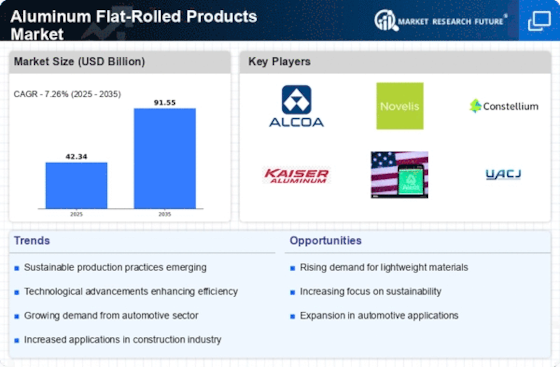
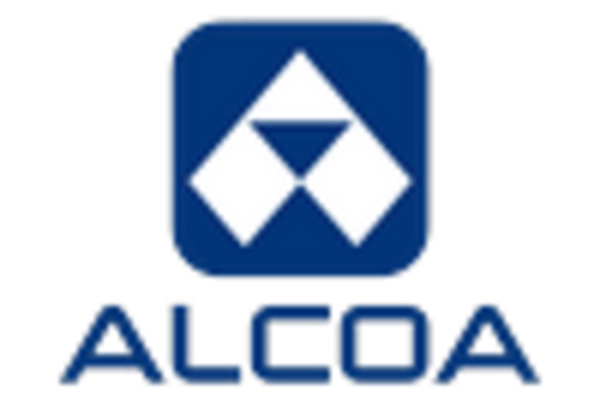

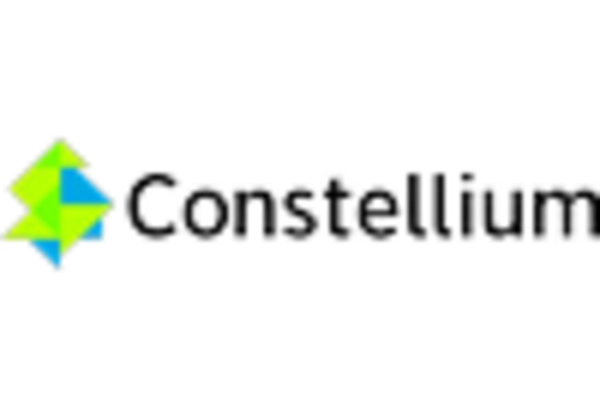
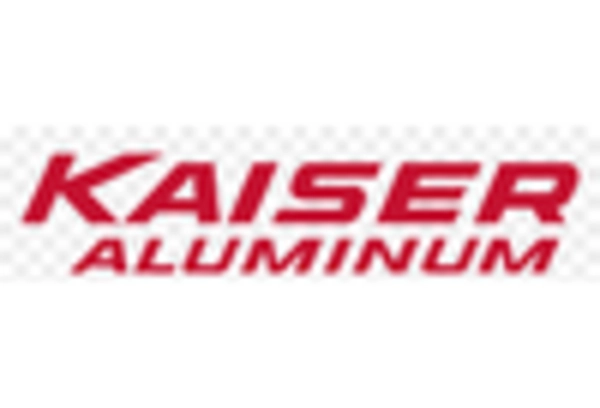

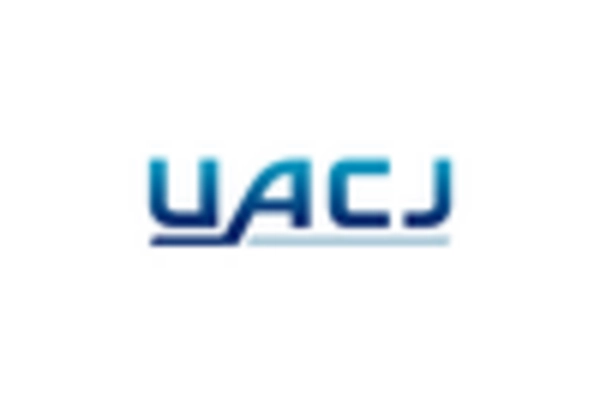









Leave a Comment